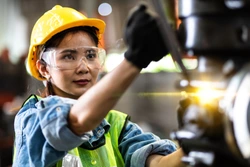Note: This interview contains themes that may be distressing
Violence against women and girls (VAWG) is a term used to cover a range of abuses against women and girls. Types of abuse it covers includes:
- Domestic homicide
- Domestic abuse
- Sexual assault
- Child abuse
- Female genital mutilation (FGM)
- Forced marriage
- Harassment
While men and boys also suffer from these types of abuse, women are disproportionally affected.
VAWG is a term adopted in the United Nations 1993 declaration on violence against women, that includes “Any act of gender-based violence that results in, or is likely to result in, physical, sexual or psychological harm or suffering to women, including threats of such acts, coercion or arbitrary deprivation of liberty, whether occurring in public or in private life.” [1]
Data from the Office for National Statistics and the 2020 Crime Survey for England and Wales revealed that in the year ending March 2020, 1.6 million women, aged 16 to 74 years in England and Wales experienced domestic abuse – this is around 7% of the female population.
The crime survey also estimated that 3% of women aged 16 to 74 in England and Wales experienced sexual assault (including attempts) and 5% experienced stalking. These trends have remained similar over the last 10 years [1].
White Ribbon UK
White Ribbon UK are a leading charity whose mission is to end male violence against women by engaging with men and boys to take a stand against violence.
Chris Green OBE is the founder and former president of White Ribbon UK. Chris founded the organisation in 2004 and his other achievements include addressing the Parliamentary Assembly of the Council of Europe, the Inter-Parliamentary Union and the Oxford, Cambridge, and Durham unions on the theme of engaging men in tackling violence against women.
He was also voted “Ultimate man of the year” by Cosmopolitan in 2007 for his work on the White Ribbon campaign.
We spoke to Chris Green about his work and what he thinks needs to be done to keep women and girls safe.

MGC: Hi Chris, I’ve only briefly explained the inspirational work of White Ribbon, can you tell me a bit more about why you started the charity?
Chris: The reason I got involved is because of my involvement in pro-feminist politics. I could have set up a men’s magazine to talk about men and masculinity and pro-feminism, but I wanted to engage with larger numbers of men. I knew that unless I did that then I would not succeed in seeing the change I wanted.
So, I saw White Ribbon in Canada doing some fantastic work and I thought that sounds like a brilliant organisation, so I set one up in the UK! The reason why I set it up is that men’s violence against women is the worst human rights violation in the world.
[…] 1 in 4 women will experience violence in their lifetime, imagine a world without men’s violence against women and girls…what would it be like? I want to live in a world like that, therefore we must engage with men to make sure the violence isn’t happening.
MGC: What are the central aims of White Ribbon that drive the work of the charity?
Chris: Simply, to wear a White Ribbon is to pledge to never to commit, never to excuse and never to remain silent against men’s violence against women and girls. In Australia there’s about 70% brand recognition of White Ribbon […], therefore a conversation has been started […] if we can start the conversation then we are starting to make progress because for so long it’s been brushed under the carpet and silence is not an option.
[…]We have to speak out about it, so that is the central aim – to engage large numbers of men in speaking out about violence against women and girls.
MGC: What do you think are currently the most relevant conversations around violence against women and girls?
Chris: Again, I go back to men’s involvement. Men must start taking responsibility with other men about the issue and if we start to do that, we are going to win the campaigning about ending men’s violence against girls and women.
For years, women have been campaigning for themselves and now it’s about time for men to start doing their share of the fighting. It’s men’s responsibility because we commit 90% of violence and it’s also our responsibility because some men in situations will listen better to the message coming from men as well as from women.
[…] By challenging that culture in men which underpins male violence, we will start to take the argument away from men who harass women, who catcall women, who say “it was only a bit of banter” – in my view there is no such thing as banter.
MGC: Recently, there has been a lot of discussion around drink spiking. What are your thoughts on this epidemic of violence, and do you have any idea as to why this is happening?
Chris: As someone that doesn’t go to nightclubs, I don’t really understand how the whole thing operates but it’s just horror. I don’t understand, that’s the trouble… I don’t understand why anyone would want to do this.
It’s so beyond my comprehension. […] These issues should be dealt with in the organisations where they come up. I want campaigns running in nightclubs, in sports clubs, in churches, in trades unions and in all sorts of cultural organisations.
A few days ago, a couple of us from an organisation called Engage had demonstrations outside the family courts because we are just so shocked at the way the court system treats women and girls. It was a demonstration of men saying men are fed up with the way the courts are treating women. You often see women’s demonstrations outside of the courts but when you see that the prosecution rate for rape cases is at an all-time low – you see that something really needs to be done.
I went to the Safer Salisbury conference, and it was held in the leading nightclub in Salisbury and members of staff from the nightclub attended, which is really good.
MGC: What are White Ribbon UK’s current projects and what previous projects have been effective?
Chris: At the moment, the main theme for the work is working around accreditation and accrediting organisations. The joy of that is that is with a small number of staff (you can’t reach every school, every workplace) but if you have an accreditation scheme so that you can just say to large organisations – okay you take on the work, you appoint ambassadors to carry the work forward.
[…] Organisations that get accredited should be proud and it means for the next two years they can look forward to all of the men in their organisations working together to take this work forward by challenging their workmates and friends.
Blackpool local authority worked with a local college, local hospitals, local faith hubs and other staff within the local authority – putting up huge signs against violence against women and girls. For me, this is mass engagement. If people are going past a huge billboard that asks them to sign up for the White Ribbon pledge, that’s what I feel very excited about.
Similarly, a couple of years ago Hull rugby team had a ‘White Ribbon game’. The players went onto the pitch saying that they were challenging men’s violence against women and girls, and they had announcements during the interval and in the program. An announcement said:
“There are 20,000 people in the stadium today, that’s also the number of women that will be attacked and suffer domestic abuse, every year in Hull – this is why we are joining the White Ribbon campaign and we want you to as well”
Now, this won’t necessarily make a huge impact on one man’s change of behaviour, but it’s a baby step on the way and that’s all we can hope for.
We also have a White Ribbon nightclub accreditation scheme which has some really good work going on. An event called ‘Girls night out’ is a really good campaign that needs more support. A lot of these campaigns are underfunded and are only run by one or two individuals but, there is momentum there. […] Nightclubs want their venues to be safe and so it’s up to all of us to act as bystanders and intervene when we can.
MGC: What can public bodies do to tackle violence against women and girls and make their services more accessible?
Chris: The number of times I’ve been asked to go into places and do one-off presentations – now that’s fine, but I always end with a call for further action. Asking what are you going to do after this presentation to make sure it doesn’t happen again and again?
There has been some research to say that one-off events are useless in terms of changing behaviour, you need ongoing education of men and boys in those institutions. In public organisations, you need ongoing commitment and that’s a huge problem with prevention work. Prevention work, to see any results, takes years and so you must keep funding it.
There are moments of great interest in change and you have to seize them when they pop up.
MGC: How can we call out violence against women and girls when we witness it?
Chris: Actually, there’s a lot of organisations doing bystander training – so those are the people to contact. Among universities, there’s been a lot of interest in bystander engagement because universities have seen – especially during freshers week – there’s a sharp increase in violence against women. They have to do consent training with their male students. I’m shocked that it isn’t compulsory. It’s compulsory that they do health and safety training for students living in flats but it isn’t compulsory when the consequences could be a lot worse.
MGC: Can you tell me a bit about White Ribbon Day on the 25th of November?
Chris: It’s the United Nations International day to end violence against women and girls. It has been celebrated as that for many years. There are White Ribbon charities all over the world and many of them deemed the day White Ribbon Day, so I latched onto that and made it the same in the UK.

It’s also the first day of 16 days of activism. That’s also very important because you don’t want people to take attention one day. Many organisations plan 16 days’ worth of events, and they will give people actions to do on each of those days. For example, sending an email, sending off a subscription to a charity – doing something that supports the activism. If you do that every day for 16 days, you’ve made a huge difference to the campaigning organisations that you need your support. For example, Women’s Aid has had a huge cut in refuge funding over the last 5 years.
I’m pleased to say that the organisation I volunteer with now called Engage has raised nearly £1000 for Women’s Aid and Afghan Women’s Aid because of a conference we ran last weekend.
It’s important for men to say – it’s our responsibility to help support these organisations because we are doing the damage.
MGC: If you could make one plea to organisation leaders, what would you say?
Chris: First of all, ask the women in the organisation what they want the men to do. Ask women what they think. The other thing I have to get in here is – if the UK would join the other 35 countries who have already signed the Council of Europe Convention to End Violence Against Women and Girls (otherwise known as the Istanbul Convention), it would make a huge difference to the protection of women [and] the provision of services, the prevention of and the prosecution of offenders. There are standard guidelines to adhere to when a country is signed to the Istanbul Convention. If it’s good enough for 35 countries, why is it not good enough for us?[…]
It’s individual behaviour we need to work on but it’s also institutional behaviour we need to fix, the Government should sign the Istanbul Convention. From an individual side, just do something – just take an action – you will never regret it.
Chris highlighted that it is crucial that men take charge of the conversation around violence against women and girls. He emphasised the power of taking small actions as a man to chip away at the larger institutional problem of violence against women and girls. He encouraged local authorities, organisations and public bodies to host events, develop long term schemes and seek accreditation to protect women and girls.
To find out more about the work of White Ribbon Uk and to get involved in their current projects, visit:
https://www.whiteribbon.org.uk/
[1] ONS. 2021. The lasting impact of violence against women and girls
Register FREE to access 2 more articles
We hope you’ve enjoyed your first article on GE Insights. To access 2 more articles for free, register now to join the Government Events community.
(Use discount code CPWR50)




